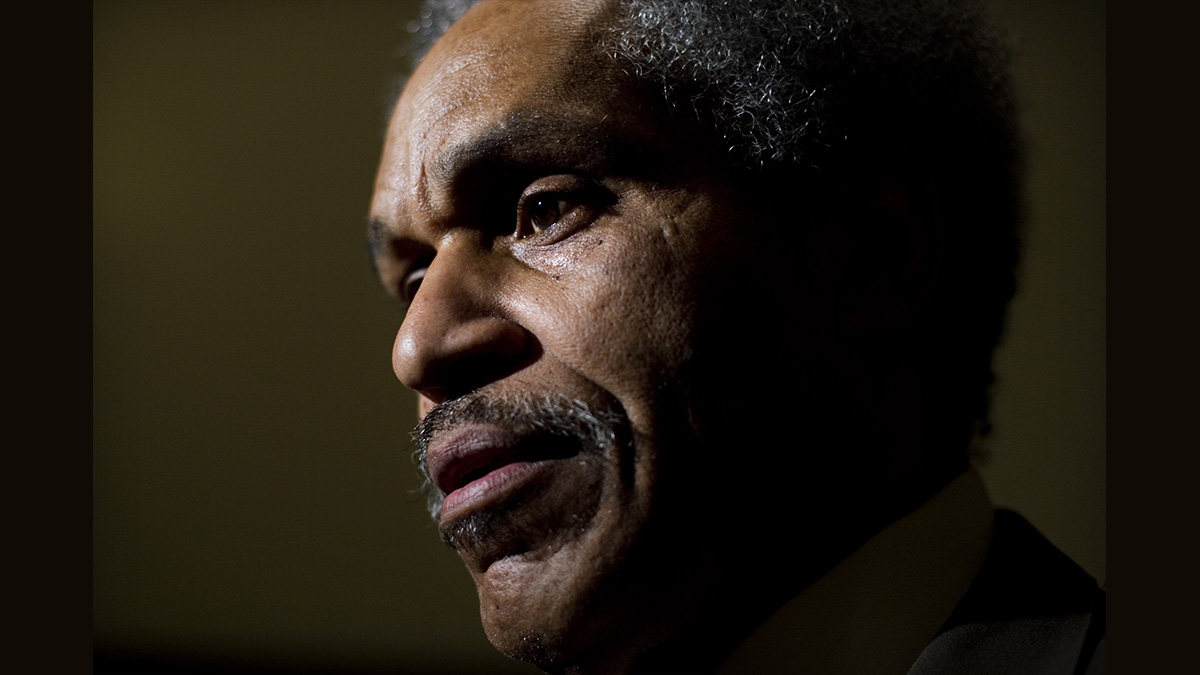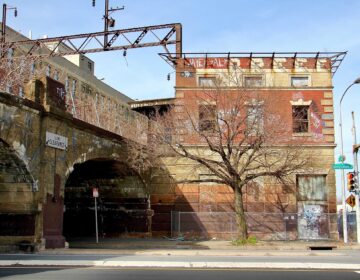Former Mayor John Street criticizes Kenney’s record on preservation; backs new PAC

Former mayor John F. Street has joined the ranks of preservationists who say Mayor Jim Kenney’s administration and City Council have failed to make historic preservation a priority in the face of heavy development pressures, allowing numerous significant older churches and other buildings to be torn down in recent years.
To persuade elected officials to fix the preservation process, Street is backing a new political action committee, RePoint Philadelphia,that will make contributions to council members, mayoral candidates, and other elected officials. The PAC has collected several thousand dollars in contributions since it was formed last year and will hold its first fundraiser Thursday night, with Street as the featured speaker.
Political action committees focused on historic preservation are exceedingly rare across the country. But Street said advocates must enter the political fray if they are going to combat tepid city policies and decisions that seem to favor developers who are eager to demolish older structures and build new ones in their place. Despite Kenney’s stated support for protecting historic buildings, he and his deputies have not been strong voices for preservation, Street said.
“You need an administration that thinks that this stuff is important,” said the former mayor, who pushed for passage of the city’s historic preservation ordinance in 1984, and helped establish protections for Eastern State Penitentiary and the Lit Brothers building. “Who are the preservation advocates in the city today? Is it (planning director) Anne Fadullon? Is it (Historic Commission executive director) Jon Farnham? Are they preservation advocates? I don’t know that they are. So who’s really advocating?”
RePoint is the second political action committee focusing on the built environment to emerge in recent years, following the establishment of the 5th Square urbanist PAC in 2015. The nonprofit Preservation Alliance already advocates for policy changes and proposes historic designations, but it cannot make endorsements or contributions. Street, who is not on RePoint’s board but urged its founders to set up the committee, said the PAC will help educate elected representatives about an issue that is often poorly understood.
“A small group of preservationists is never going to be able to put up the kind of money that the development community can put up. But in all fairness, we need to make our position pretty clear about some of this stuff and having a check for $500 or $1,000, as small as it might be, I think makes a very strong statement that we care about this issue and we want to make sure that it’s fresh on the minds of the members of council and other people who are running for public office,” he said.
The PAC’s chairman, Aaron Wunsch, said it remains to be seen if RePoint will siphon off some political contributions that well-off preservation supporters would have otherwise given to Kenney’s campaign ahead of next year’s mayoral election. Their support for Kenney will depend on how seriously he takes recommendations that the city’s Historic Preservation Task Force is expected to issue in the next few months, and on the stances that mayoral challengers take on preservation, Wunsch said.

Wunsch, an assistant professor of historic preservation at the University of Pennsylvania, has forcefully criticized the city’s preservation apparatus but said he was once hopeful that Kenney would do more on the issue. He was encouraged by Kenney’s 2014 proposal to increase the Historical Commission’s budget by $500,000 and accelerate the nomination of buildings to the city’s Register of Historic Places, and he hosted a fundraiser for the candidate in his home, he said.
Kenney’s earlier bill never advanced, although he did later increase the Historical Commission’s budget by $96,000, allowing it to hire two more staffers and resume work nominating buildings for designation. The commission has approved three new historic districts that extend protections to many buildings at once, most recently the Ridge Avenue Historic District last week. The city also set up the task force to recommend changes to Philadelphia’s historic preservation ordinance.
But Wunsch said demolitions have continued apace and he’s deeply disappointed by some of the administration’s decisions. He cited a decision by Fadullon, who comes out of the development industry, not to try to keep the former Robinson department store on Market Street on the local historic register. After the building’s owners succeeding in having the designation overturned in a highly unusual Licenses and Inspections Review Board hearing, Fadullon wrote that the city “believes that the public’s interest in redevelopment there significantly outweighs the public’s interest in the preservation of the façade,” and declined to fight the decision.
Wunsch said he thinks some officials under Kenney have discouraged the mayor from making preservation more of a priority. “Even mayors who do care about preservation rely on their appointees and their underlings to be experts on this, and if the advice they get doesn’t pass the smell test in the preservation field, they’re not going to know it, and people who give them that advice will immediately tell them that everyone else is crazy and they should listen to them,” he said.
He and others are skeptical that the task force will accomplish much; Wunsch described it as a “quickly grown fig leaf” to distract from the administration’s poor record on preservation.
“The ordinance has never been the problem. The way it’s being interpreted and administered is the problem, and the lack of political will to really enforce it has been the problem. Nothing the task force is doing can address the problem of political will. It’s simply not within its purview,” he said. “So even if they produce the best set of recommendations ever, at the end of the day, none of it matters if the political will to implement it isn’t there. That is why a PAC matters.”
RePoint co-founder Janice Woodcock, an architect who served as Street’s planning director, said another issue is a 2016 charter change that led to the creation of a Department of Planning and Development that oversees the Historic Commission and three other divisions. The Historic Commission previously had some independence to serve an advocate for preservation but is now more subordinate to the administration’s broader planning agenda, she said.
Wunsch and Woodcock said they hope to influence the current and future administrations by endorsing and contributing to mayoral candidates, and by making strong preservation arguments more prominent in the public debate over development.
“Our hope is to have a political organization that is able to reward good behavior, but also is a synthesis group that says, if Philadelphia were able to look at historic preservation and embrace it, like many cities, it could be a great economic tool,” Woodcock said. “It doesn’t have to be combative, and we can all agree there are things that should be saved. Not everything, but some things that should be saved. It’s the same kind of perspective that the task force has had, but probably we’re a little more on the preservation side than the task force is going to end up being.”
Paul Steinke, executive director of the Preservation Alliance, said he welcomes the new PAC and has personally contributed to RePoint. He expects the committee will play a complementary but different role than his organization, he said.
RePoint is looking “to have a much more pure advocacy voice from the community side. There’s a place for that,” Steinke said. “It’s a role we sometimes do play, but we also try to incorporate the views of developers, especially developers who are preservation-friendly, and there are numerous such developers in the city. Aaron has a more jaundiced view of the development industry as a whole and is approaching the problem more from the standpoint of pure preservation. That’s legitimate. It’s a voice that is valid and necessary.”
The PAC will also lobby council members with the aim of influencing the administration and getting legislation passed. None of the council members have come out as a dedicated preservation champion, but Woodcock said Councilwoman Helen Gym has offered the group encouragement, and she noted that Councilman Curtis Jones pushed for the creation of the Ridge Avenue Historic District.
Like many preservation advocates, the PAC members would like the city to institute a demolition review process, which could prevent some of the sudden tear-downs that have led to the loss of a number of historic but undesignated buildings, and to offer better financial incentives for repair and renovation of historic structures. Street said the city has been able to find ways to increase funding for schools, parks, and other priorities recently, and could afford to create a preservation fund for low-income property owners if the political will were there.
“We have all these old structures and a lot of them are wonderful, wonderful old buildings. Many of them are owned and occupied by low-income Philadelphians in neighborhoods, and it’s hard for them to resist somebody giving them a little bit of money, or a lot of money, and then (the buyer) can tear it down or do whatever they want,” Street said. “I know a woman who had an old, very nice property, and somebody gave her $250,000. That property’s gone now.”
The 10-year tax abatement for new construction, which became law when Street was mayor, is a major driver of development-driven demolitions, the PAC members said. The abatement should be modified, perhaps by giving an additional benefit for historic renovation costs or offering financial assistance for preservation that would counter the abatement’s impact, they said.
RePoint’s fundraiser will be held Thursday at Historic Engine Company No. 11 on South Street.
WHYY is your source for fact-based, in-depth journalism and information. As a nonprofit organization, we rely on financial support from readers like you. Please give today.





